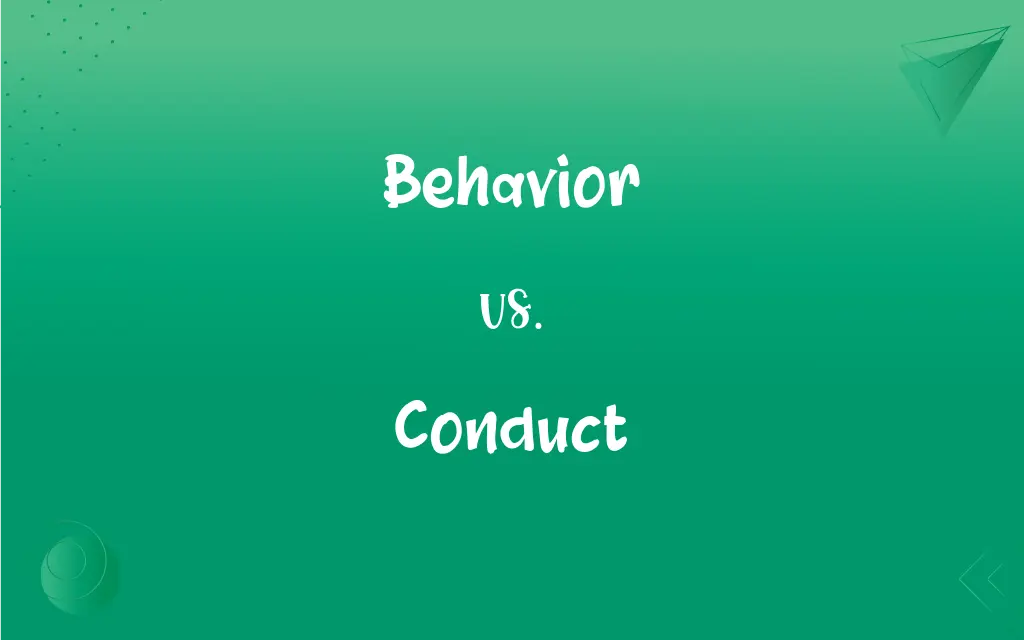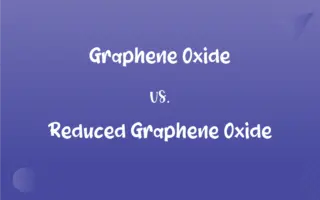Behavior vs. Conduct: What's the Difference?
Edited by Aimie Carlson || By Janet White || Published on January 27, 2024
Behavior refers to actions or reactions of an individual or group; conduct refers to the manner of acting, especially regarding moral qualities.

Key Differences
Behavior is a broader term encompassing how individuals or groups act or react in various situations, often influenced by environment, genetics, or culture. Conduct, however, specifically refers to actions as they relate to moral, ethical, or professional standards.
Behavioral patterns can be observed across different species, focusing on the psychological and biological aspects. Conduct is more human-centric, emphasizing adherence to or deviation from accepted norms and values.
Behavior can be involuntary or subconscious, like a child's behavior influenced by their surroundings. Conduct typically implies a more conscious choice, aligning with societal or professional expectations.
The study of behavior is a key aspect of psychology, biology, and sociology, focusing on understanding actions and reactions. Conduct is often discussed in legal, ethical, and organizational contexts, focusing on standards of behavior.
Behavior can vary widely and includes both positive and negative aspects. Conduct often carries a judgmental connotation, being assessed against a set of standards or rules.
ADVERTISEMENT
Comparison Chart
Scope
Broad, encompasses actions and reactions
Specific, relates to moral and ethical actions
Focus
Psychological, biological aspects
Moral, ethical, professional standards
Nature
Can be involuntary or subconscious
Usually involves conscious choice
Study Field
Psychology, sociology, biology
Ethics, law, organizational studies
Connotation
Neutral, observational
Often judgmental, based on standards
ADVERTISEMENT
Behavior and Conduct Definitions
Behavior
The response to a specific stimulus.
Consumer behavior is crucial for marketing.
Conduct
The manner of acting or controlling oneself.
His conduct during the meeting was exemplary.
Behavior
Observable actions of a person or animal.
The behavior of dolphins is fascinating to researchers.
Conduct
Directing or managing an activity.
He will conduct the orchestra tonight.
Behavior
Manner of conducting oneself.
His polite behavior was appreciated.
Conduct
Behavior in a professional context.
The teacher's conduct was under review.
Behavior
The way an individual acts or reacts.
Her behavior changes in stressful situations.
Conduct
Observance of rules or standards.
She was praised for her ethical conduct.
Behavior
A pattern of activity.
Studying the behavior of galaxies helps in understanding the universe.
Conduct
The way one behaves, especially in public.
Her conduct at the event was impeccable.
Behavior
The manner in which one acts or behaves.
Conduct
To direct the course of; manage or control
A police officer who conducts traffic.
A scientist who conducts experiments.
Behavior
The actions or reactions of a person or animal in response to external or internal stimuli.
Conduct
To lead or guide
Conducted the tourists through the museum.
FAQs
Is 'behavior' spelled differently in British English?
Yes, in British English it's spelled 'behaviour.'
Can 'behavior' refer to actions of non-living things?
Rarely. It's primarily used for living beings, though sometimes metaphorically for systems or machines.
What is 'good behavior'?
Good behavior refers to actions that are socially acceptable or polite.
What does 'behavioral pattern' mean?
It refers to a repeated, predictable way of acting or responding.
What is a 'behavioral disorder'?
It's a type of disorder that affects the way a person behaves, like ADHD.
Can 'conduct' be a verb?
Yes, as a verb, it means to lead, guide, or manage something.
Can 'behavior' be inherited?
Some behaviors can be influenced by genetics, but environment also plays a crucial role.
What does 'behavior' mean?
Behavior refers to the way a person or animal acts or responds in different situations.
Does 'behavior' imply intention?
Not always. It can be both intentional and unintentional.
Is 'behavior' the same as 'manners'?
Not exactly. 'Manners' are more about social customs, while 'behavior' is broader.
What is 'behavioral science'?
It's the study of the behavior of humans and animals, often focusing on psychology and sociology.
Is 'conduct' used in science?
Yes, in physics, it's used to describe how materials transmit heat, electricity, or sound.
What is 'professional conduct'?
It refers to the behavior expected of someone in a professional setting.
Can 'conduct' refer to the way someone handles a situation?
Yes, it can describe how a person manages or deals with a specific scenario.
How does 'conduct' differ from 'behavior'?
'Conduct' often has a more formal or ethical connotation, while 'behavior' is more general.
What does 'code of conduct' mean?
It's a set of rules outlining the norms and responsibilities of, or proper practices for, an individual or organization.
Can 'conduct' be synonymous with 'behavior'?
In many contexts, yes, but 'conduct' often carries a more formal or ethical implication.
What does 'conduct' mean?
Conduct refers to the manner in which a person behaves, especially on a moral level.
Is 'conduct' always intentional?
Yes, conduct usually implies a degree of intention and control.
What does 'misconduct' mean?
Misconduct is inappropriate or wrong behavior, often violating a code or standard.
About Author
Written by
Janet WhiteJanet White has been an esteemed writer and blogger for Difference Wiki. Holding a Master's degree in Science and Medical Journalism from the prestigious Boston University, she has consistently demonstrated her expertise and passion for her field. When she's not immersed in her work, Janet relishes her time exercising, delving into a good book, and cherishing moments with friends and family.
Edited by
Aimie CarlsonAimie Carlson, holding a master's degree in English literature, is a fervent English language enthusiast. She lends her writing talents to Difference Wiki, a prominent website that specializes in comparisons, offering readers insightful analyses that both captivate and inform.






































































